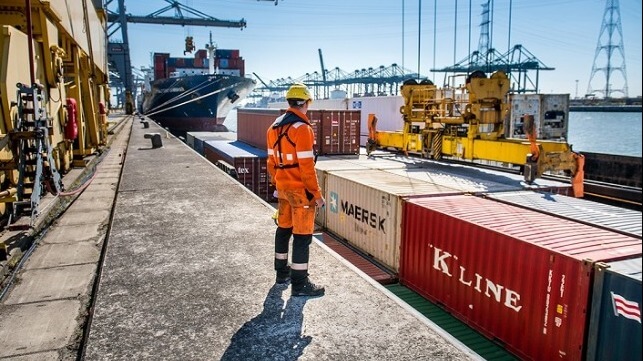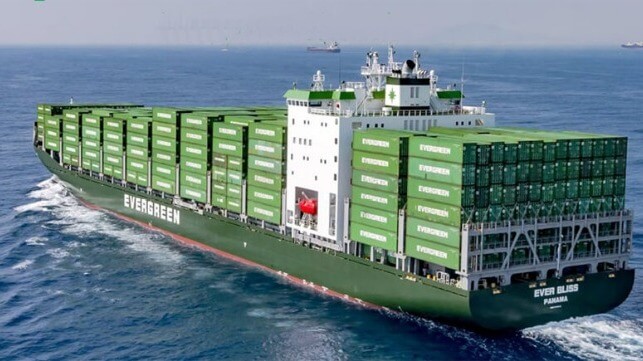CRIMINAL CAPITALI$M
Europol Says Corruption is Enabling Criminal Gangs to Infiltrate Ports

Europol, the EU agency charged with preventing and combatting international and organized crime, issued its first report exploring how organized crime infiltrates the ports of Europe. Detailing its findings and releasing the 24-page report today in The Hague, Europol said that it believes criminal networks are constantly evolving in their techniques as they are increasingly working toward infiltration of and control over major logistical points. The agency is calling for increased cooperation and awareness and focused efforts to address the challenges of crime in Europe’s ports.
“The Europol report on criminal networks in ports illustrates what we are up against. It lays bare the sophistication of criminal drug gangs, their strength, and their savagery,” said Ylva Johansson, Commissioner for Home Affairs for the European Commission. “The drug traffickers promote corrupt actions and practices sometimes by bribery, sometimes by intimidation. We are working with authorities at all levels to strengthen systems in the fight against the criminal activity this report outlines.”
The analysis was conducted with the Security Steering Committee of the ports of Antwerp, Hamburg/Bremerhaven, and Rotterdam. Europol said that Europe’s three biggest ports are among the most targeted for criminal infiltration although organized crime networks are also expanding into smaller ports as a means of avoiding enforcement. In the last few years, they estimate that at least 200 tons of cocaine have been trafficked through the ports of Amsterdam and Rotterdam alone.
The report finds that the structure of the ports and the nature of their operations makes them vulnerable to infiltration. They highlight the open structure, need for access, growing automation, and a large number of companies and personnel involved in port operations.
However, they point to the volume of goods moving through the ports and the fact that the percentage of containers and imports inspected is low. For example, in 2021, the report highlights that a total of 3.5 billion tons was imported through Europe’s main ports with containers accounting for a quarter of the goods handled or some 90 million TEU. Authorities are only able to inspect between 2 and 10 percent of the containers.
“Corruption is a key enable for criminal infiltration of ports,” the report concludes. “This includes port workers and personnel of shipping companies, freight forwarders/shipping agents, importers, transport companies, terminals, security companies, law enforcement, and customs. Bribery fees may reach hundreds of thousands of euros. The highest fees are paid to essential links in the extraction chain, often crane operators, planners, or employees providing access to information via IT systems. Coordinators of extraction teams receive between 7 to 15 percent of the value of the illicit load.”
They also point to the gangs seeking new modus operandi that require the corruption of fewer individuals. In 2018, law enforcement in Rotterdam detected a new technique involving the misappropriation of container reference codes. This has also been detected in Antwerp and they believe is being used more broadly as it requires the corruption of just one individual to gain the code and the possible use of “extraction teams,” to gain access and remove the contraband.
The report identifies a few common techniques used in smuggling including “rip-on/rip-off” where the drugs or other items are hidden with legitimate imports and retrieved in or outside the port at the destination. A newer switch method involves moving the drugs between containers during inter-community transport from one EU country to another. However, the gangs are also becoming more sophisticated by cloning containers by using the same registration number of multiple boxes. “Trojan horse containers,” are used to get extraction teams into the port often hidden inside an export container sometimes days before the arrival of the illicit goods.
The main recommendations of the report include better international information exchange as they note the gangs have infiltrated ports on all the continents. They said ports must integrate security features into the design of their infrastructure and public-private partnerships need to be implemented to involve all port actors essential for tracking the infiltration.
As the first cooperation between ports, the report is seen as a first step in building common efforts. Europol is also calling for legislative initiatives at the European level to support the ports and streamline security measures.
Robbers Board Evergreen Boxshp in Manila Anchorage

Evergreen Lines confirmed to the media in Manila in the Philippines that one of its containerships was briefly boarded by robberies while in the port’s anchorage. While none of the crew was seriously injured, it is being considered an unusual incident and is being investigated by the authorities.
One of the line’s smaller containerships, a B-Tyle vessel was boarded by an unknown number of robberies. The vessel, the Ever Boomy (37,300 dwt) arrived in the Manila anchorage on April 3 on her normal route which had included port calls in China and Taiwan. The vessel was laying in the outer anchorage waiting for its berth. Built in 2018, the vessel is 695 feet long with a capacity of 2,880 TEU.
The robbers came aboard the vessel and were discovered around 0200 on the morning of April 5 while the containership remained at anchor. An able seaman on watch on the deck was accosted by the boarders. He was assaulted and tied up. Unconfirmed reports in the newspapers said at least one crewmember was also threatened with a knife and that the sailor who was tied up feared they might attempt to throw him overboard. The media indicates that the crewmember was able to free himself.
Evergreen in its statement said that the captain of the Ever Boomy immediately notified the Philippine Coast Guard and Panama as the ship’s flag state. The Coast Guard and local authorities came to the vessel and confirmed the safety of the crew. Evergreen said that no one was injured, and a search of the ship showed that there was no major property loss.
The Ever Boomy was able to proceed to the terminal. The vessel departed, today, April 6, on its normal route bound for Thailand.
These types of boardings by robbers are more common in other parts of Asia and other anchorages around the world. ReCAAP ISC, which is the reporting agency for maritime incidents in Asia, issued an update at the end of March showing that there were four boardings reported in the last five days of March in the eastbound lanes of the Singapore Strait in an area near Indonesia. Engine spares were stolen in one incident and spare parts for the fuel pumps were stolen in another incident. ReCAAP and other security agencies have repeatedly warned of the dangers in the area. The agency highlights that a total of 18 incidents were reported in the Singapore Strait since January 2023 and the danger remains as none of the perpetrators have been arrested.
No comments:
Post a Comment